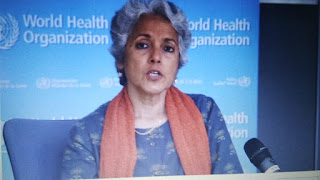Social Media Q&A live with Dr. Soumya Swaminathan, Chief Scientist, WHO
Key Takeaways-
-Studies regarding Delta variant with additional mutation are underway and WHO is keeping a close look at its newly developed variant, AY.1.
-Research institutes should effectively track efficacy of vaccines to collect more information to share with the public and the institutions.
- WHO has the power to revoke any vaccine that loses its effectiveness against any current variants.
- Vaccines elicit level of efficacies, for instance in the case of mRNA vaccines like Moderna that elicit high antibodies and induce higher immune responses.
- Immunology of vaccines is complex and studies are underway to come out with any conclusion at present.
- Until 60-70 percent of the population are vaccinated fully across the world, individual responsibilities take precedence to protect self and family to reduce any further transmission.
-Countries with growing infection rates should be careful. One size doesn't fit all but one should be careful in controlling transmission with the help of public and social health measures. WHO supports the idea- 'No one is safe until everyone's is safe'.
- Data regarding mixing of vaccines, for example, BioNtech and Pfizer vaccines are available in abundance now but we need to get some more solid data to finally roll it out further.
- Risks are very rare and benefits are huge in case of vaccines today. So, WHO recommends everyone to get their vaccination done to build a safer community.
- Stroke patients are at higher risks and they should take vaccines but people having more critical conditions must get prior advice referred by the medical professionals.
- Immune response of vaccines can last longer than one year. Some vaccines are doing better but we need to keep a track of their trajectories.
- As of now, we have no response on boosters, but yes, strong immune response doesn't need both the jabs. If one gets COVID, high antibodies are developed in the body that limits the number of vaccination shots to just one.
- We don't have any reasons to believe that any vaccines will have any impact on fertility whether its men or women. Spike proteins of virus can only increase the potent response and doesn't create any fertility issues.
- We have enough data available regarding administration of Pfizer vaccines to children above 12 are safe, but children are not at higher risk at present, priorities must be given to vulnerable groups first.
- Its good to have the second shot after a gap of 6-8 weeks. Once the body gets infected, one booster is enough after a gap of six months. Some of the countries are coming up with such regulations.
- Keep your masks on, avoid social mixing, gathering etc. - are some good old practices to reduce community transmission.
- Lots of research are underway regarding the use of the combination of nasal and oral pharyngeal administered therapies to prevent COVID.
-A couple of Nasal vaccines have finished their trial phase one and have jumped to phase two part of clinical trials.
#COVIDupdate #SocialMediaLive #QandA #WHO #vaccines #Therapies #issues #AskWHO


.jpg)

Comments
Post a Comment